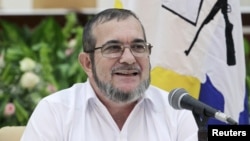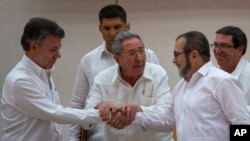All of Colombia's Marxist FARC rebels, from foot soldiers to commanders, are committed to peace talks, its leader said, and while the group will continue to fight government policy, the battle will go ahead without any shots being fired.
The Revolutionary Armed Forces of Colombia (FARC) will continue to defend its ideology and seek land reform if an end to the five-decade war end is reached in Havana, rebel leader Rodrigo Londono said in an interview broadcast on Tuesday, suggesting changes would come from the ballot box.
Rumors have circulated for months that many of the FARC's 8,000 fighters are not on board with the talks and the five-point agenda. Critics have said disgruntled former fighters may turn to drug trafficking crime gangs once the group disbands.
"I give full assurance that not one member of the FARC has expressed disagreement," said Londono, 56, known by his nom de guerre Timochenko. "War is synonymous with death and misery."
The veteran combatant, who until last week was only ever seen in battle fatigues making video-taped statements from jungle camps, said a six month time limit recently agreed to by the two sides may not be enough.
Speaking on TeleSur TV channel to leftist former Senator Piedad Cordoba, Londono said the deadline would depend on how much political will there is to seal a complete accord.
"If there's will, we could do it before, but six months may be too short," said Londono, who traded his camouflage and rubber boots for civilian summer garb.
The remaining topics on the agenda are complex, Londono said.
The government and rebels have been in talks for nearly three years, seeking an end to the conflict that has killed more than 220,000 people and displaced millions.
Last week Londono and President Juan Manuel Santos met in the Cuban capital to shake hands on a justice accord that may push the talks toward a final deal.
They pledged to create special tribunals to try former rebels and military suspected of war crimes. Already partially agreed are accords on land reform, political participation for ex-rebels and the illegal drugs trade.
On Tuesday, the FARC said the accord does not address possible prison time for those who confess crimes committed during the war. The government had said the accord established that those responsible for massacres, kidnappings, forced disappearances, torture and sexual violence would serve time in austere conditions.











